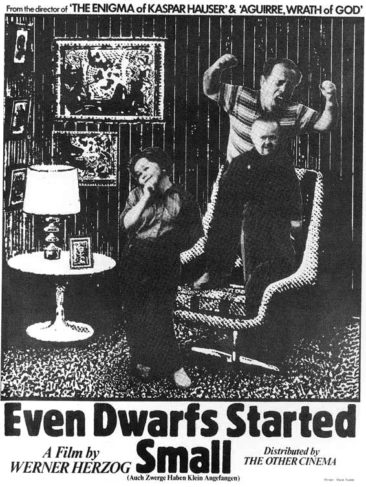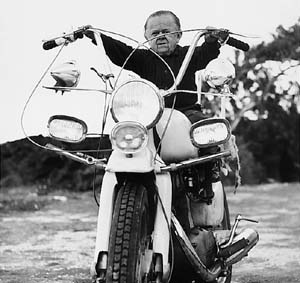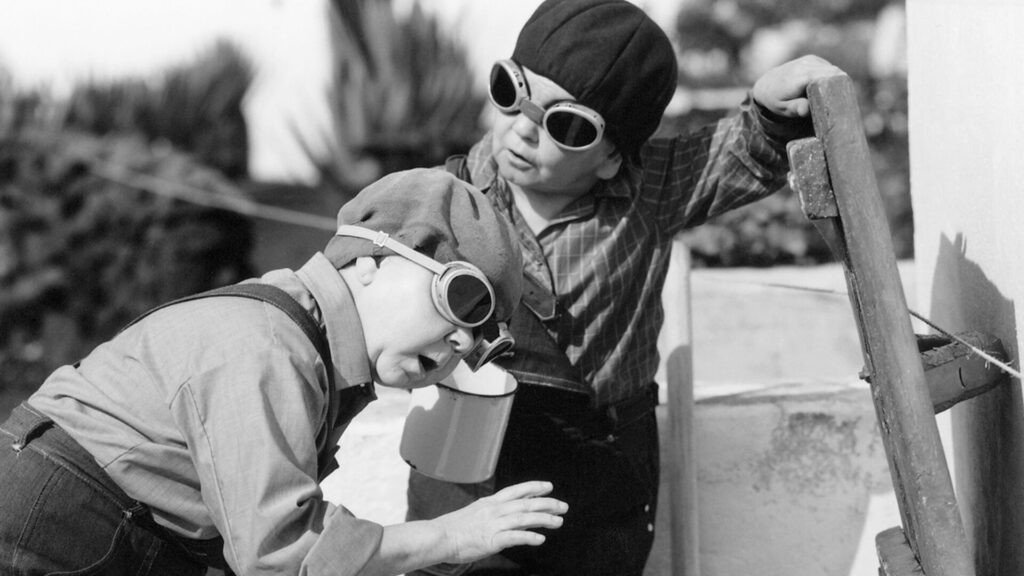 A strange, anarchic masterpiece from German filmmaker Werner Herzog, who was mining a vein similar to the films of David Lynch and Harmony Korine years before those guys came into vogue. It’s disturbing, yes, but also curiously fascinating and addictive.
A strange, anarchic masterpiece from German filmmaker Werner Herzog, who was mining a vein similar to the films of David Lynch and Harmony Korine years before those guys came into vogue. It’s disturbing, yes, but also curiously fascinating and addictive.
Everyone in this film…is a dwarf…
EVEN DWARFS STARTED SMALL (AUCH ZWERGE HABEN KLEIN ANGEFANGEN) was completed in 1968, and in retrospect can be viewed as an oblique commentary on the revolutionary fervor of the time. The uprisings of the late sixties ultimately gave way to apathy and conservatism, so it seems appropriate that the revolutionaries in this film are dwarfs who constantly find themselves stymied by things like cars, beds and doorknobs, all too big for them to properly use, which results in an extremely half-assed revolt.
Everyone in this film, you see, is a dwarf, yet the props and décor are all normal sized. It was the first time such a stunt had been attempted since the 1938 all-midget western THE TERROR OF TINY TOWN, although a more pertinent comparison would be Todd Browning’s FREAKS, an admitted inspiration. Beyond that the oppressiveness of EVEN DWARFS STARTED SMALL was inspired by the making of Werner Herzog’s previous film, the eccentric documentary FATA MORGANA, during which Herzog and his crewmembers were interned in an African prison and subjected to beatings and starvation.
I consider EVEN DWARFS STARTED SMALL, his second feature, to be one of Herzog’s finest films not to mention one of his most underrated.
Who is Werner Herzog? He was one of the guiding lights of the “New German Cinema” of the seventies along with Rainer Werner Fassbinder and Wim Wenders, although Herzog’s approach to moviemaking was entirely different than those of Fassbinder or Wenders, or for that matter anyone. An extremely prolific filmmaker, Herzog creates deeply idiosyncratic cinematic meditations like AGUIRRE: THE WRATH OF GOD, THE ENIGMA OF KASPER HAUSER, NOSFERATU THE VAMPYRE, STROZEK and FITZCARRALDO. I consider EVEN DWARFS STARTED SMALL, his second feature, to be one of Herzog’s finest films not to mention one of his most underrated. It was heavily reviled upon its initial release (Herzog reportedly received death threats every night it played) and inexplicably vanished from circulation for decades, at least until Anchor Bay’s thrice-welcome 1999 DVD release.
Herzog reportedly received death threats every night it played.
In the midst of a godforsaken windswept desert, a bunch of dwarfs interned in a secluded insane asylum brutally rebel against the headmaster (a little person himself). The latter reacts by shutting himself in an upper room of the asylum along with one of the rebel dwarfs, who he ties to a chair. In the courtyard below the dwarfs gleefully engage in subversive acts that include attempting to force one of their number to have sex with another (the would-be aggressor can’t manage to get up on the bed), rifling through the headmaster’s porn stash and torturing two blind dwarfs who swing sticks at their unseen tormentors, which inevitably come to include each other.
Amidst this orgy of destruction the dwarfs expand the scope of their rebellion to include nature itself: they uproot a palm tree, burn flowers, kill a pig, crucify a monkey and use live chickens to bombard the headmaster. Eventually the latter goes insane and escapes his confines, but winds up hypnotized by a tree as around him the madness continues and an errant dwarf laughs himself to death.
EVEN DWARFS STARTED SMALL was the second feature film for the twentyish Werner Herzog, and represented a huge leap for a filmmaker whose first and third features (SIGNS OF LIFE, 1968, and AGUIRRE: THE WRATH OF GOD, 1972) both contained fairly straightforward narratives. DWARFS, by contrast, is wildly anarchic and abstract in its construction.
 Herzog at the time was primarily known for making documentaries, and while DWARFS, with its seemingly pell-mell cavalcade of destruction, often has the undisciplined feel of a documentary, it was apparently carefully designed and scripted. That’s evident in the camerawork, which is always shot at the eye-level of its diminutive subjects, thus making the surroundings seem alien. The film’s music score is equally innovative, consisting of a young girl singing a German folk song with recording done (Herzog claims) in a cave by the filmmaker himself, which makes for a darkly comedic and even haunting accompaniment to the oft-surreal visuals.
Herzog at the time was primarily known for making documentaries, and while DWARFS, with its seemingly pell-mell cavalcade of destruction, often has the undisciplined feel of a documentary, it was apparently carefully designed and scripted. That’s evident in the camerawork, which is always shot at the eye-level of its diminutive subjects, thus making the surroundings seem alien. The film’s music score is equally innovative, consisting of a young girl singing a German folk song with recording done (Herzog claims) in a cave by the filmmaker himself, which makes for a darkly comedic and even haunting accompaniment to the oft-surreal visuals.
The film’s music score is equally innovative, consisting of a young girl singing a German folk song with recording done (Herzog claims) in a cave by the filmmaker himself, which makes for a darkly comedic and even haunting accompaniment to the oft-surreal visuals.
The black and white photography by Thomas Mauch contributes immeasurably to the film’s overall effect. Herzog always was primarily concerned with images, and in DWARFS he and Munch impart sights as striking and nightmarish as just about any you’ll see: chickens cannibalizing one another, piglets desperately sucking at the teats of their dead mother, a driverless car sputtering in an endless circle, blind dwarfs in overalls and aviator goggles swinging large sticks at invisible opponents, a box of dead insects dressed in miniature wedding attire, and the unforgettable final shot of a dwarf standing in place and laughing maniacally.
But for all its virtues the film is deeply troubling, and not just because of the all the onscreen mayhem. Its portrayal of dwarfs as objects of existential horror verges on exploitative, and ultimately isn’t that far removed from the notorious finale of Michael Winner’s seventies sleaze-fest THE SENTINAL, wherein real-life human oddities portrayed Hell-spawned demons. Then again though, not too many films then or now are peopled entirely by dwarfs, and nor are there many films as rich as disquieting as this one, exploitative though it may be.
Vital Statistics
EVEN DWARFS STSRTED SMALL (AUCH ZWERGE HABEN KLEIN ANGEFANGEN)
Werner Herzog Filmproduktion
Director: Werner Herzog
Producer: Francisco Ariza
Screenplay: Werner Herzog
Cinematography: Thomas Mauch
Editing: Beate Mainka-Jellinghaus
Cast: Helmut Doring, Gerd Gickel, Paul Glauer, Erna Gshwendtner, Gisela Hertwig, Gerhard Marz, Hertel Minkner, Alfredo Piccini, Gertraud Piccini, Brigitte Saar, Marianne Saar, Erna Smolarz, Lajos Zsarnoczay

